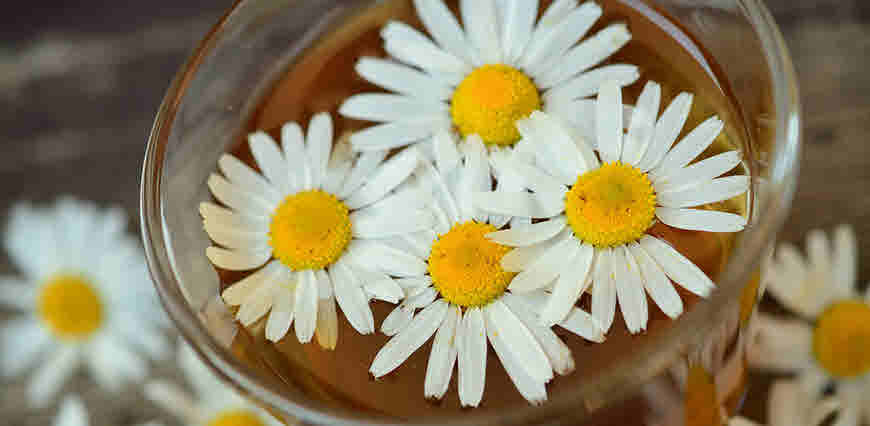Chamomile is flowering medicinal herb from Asteraceae family. It is available in two varieties, German Chamomile and Roman Chamomile. It has been used traditionally to treat various health conditions such as insomnia, sleep disorders, anxiety, stress, stomach problems and skin problems. Chamomile is folk medicine to treat infant colic, dyspepsia and diarrhea. Some studies has shown its beneficial effect in curing infant colic when given in the form of herbal tea in a dose of 150 ml three times a day.

Common Names: chamomile, German chamomile, camomile, Hungarian Chamomile, True chamomile, Common chamomile, Small camomile, Horse gowan
Botanical Names: Matricaria recutita (German chamomile or wild chamomile), Chamaemelum nobile (Roman or English, chamomile)
Family: Asteraceae syn. Compositae
Chamomile is annual herbaceous plant native to Europe which grows to height of one to two feet. It has solitary flower at the top of the branches. These aromatic flowers are white in color with yellow centre. Its flowering time is from late spring to early summer. The flowers are sweet, calming, cooling and used for medicinal purpose.
Medicinal properties of Chamomile
Chamomile has analgesic, antiallergenic, antibacterial, antifungal, anti-inflammatory, anti-rheumatic, antiseptic, antispasmodic, carminative, digestive, muscle relaxant, nervine, sedative, stomachic, carminative, bacteriostatic and fungistatic properties.
The flowering tops of Chamomile is used to prepare
Herbal tea, liquid extracts
Tincture, gel
Capsules, mouth wash, eye wash, etc.
Homeopathic medicines
Chamomile Tincture recipe and medicinal uses
Tinctures are prepared using herbs and alcohol. These can be used internally as well as externally. Here is given ingredients and process of preparing Chamomile tincture at home. For this preparation you need alcohol (Vodka or brandy) and flower heads of Chamomile.
Recipe of Chamomile Tincture
- Take chamomile flowers (1 cup) and put in a glass jar.
- Pour brandy or vodka (2 cups) on the herb.
- Tighten the lid and leave the container for a month.
- Stir occasionally.
- After a month, strain off the herb and use the tincture.
Medicinal uses of Chamomile Tincture
- Helps to induce sleep, can be given to child suffering from troubled sleeping
- Cures insomnia, sleep disorders
- Reduces anxiety, stress
- Gives relief in menstrual cramps, diarrhea
- Used externally to wash cuts, wounds
- External application gives relief in bleeding gums, teething trebles
The Dosage of Chamomile Tincture
For adults: 1/2 to 1 teaspoon thrice a day
For children: 1 ml to 3 ml (depending on age) thrice a day
Chamomile Tea Recipe and Health Benefits
The two varieties of Chamomile which are generally used are German Chamomile (Chamomilla recutita) and Roman Chamomile (Chamaemelum nobile). The dried flower from this herb is used to prepare tea which has sedative and calming effect on the body. Chamomile tea has anti-depressant, tranquillizer, sedative, anticonvulsant and carminative effect on the body.
This herbal tea is very helpful in treating sleep related disorders. The tea also has good effect on digestion related problems such as indigestion, gas, nausea, motion sickness and low appetite.
Recipe of Chamomile Tea
Ingredients: Dried flowers of Chamomile, water and honey (optional)
- Put water (1 cup) in a pan and bring it to boil.
- In a ceramic or glass cup, add dried herb (1-4 gms).
- Pour boiling water on the cup.
- Steep for ten minutes.
- Strain and drink.
You can drink this tea 3-4 times a day. Drinking this tea before going to bed helps to induce sound sleep.
Medicinal uses of Chamomile Tea
- Mild sedative effect on body
- Helps to reduce day to day stress, anxiety
- Acts as antioxidant, muscle relaxant
- Helpful in hysteria, nightmares, insomnia, sleep disorders and similar mind related problems
- Induces sleep
- Helpful in stomach aches, colic, digestive problems, menstrual cramps, muscle ache, fever
- Gives relief in catarrh, cold, sore throat
- Improves appetite
- Can also be used as mouth wash, eye wash
- The consumption of Chamomile tea is generally safe. But its use should be avoided in pregnancy and while taking medicines which are blood thinners.